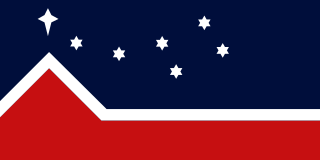The politics of Canada functions within a framework of parliamentary democracy and a federal system of parliamentary government with strong democratic traditions. Canada is a constitutional monarchy where the monarch is head of state. In practice, executive authority is entrusted to the Cabinet, a committee of ministers of the Crown chaired by the Prime Minister of Canada that act as the executive committee of the King's Privy Council for Canada and are responsible to the democratically elected House of Commons.
The Green Party of British Columbia, or simply the BC Greens, is a provincial political party in British Columbia, Canada. It was founded in 1983 and is based in Victoria. The party won its first seat in the Legislative Assembly of British Columbia in the 2013 provincial election.

The British Columbia Social Credit Party, whose members are known as Socreds, was the governing provincial political party of British Columbia, Canada, for all but three years between the 1952 provincial election and the 1991 election. For four decades, the party dominated the British Columbian political scene, with the only break occurring between the 1972 and 1975 elections when the British Columbia New Democratic Party governed.

The British Columbia Unity Party was a political party in British Columbia, Canada. The party was founded as an attempted union of five conservative parties: the Reform Party of British Columbia, the British Columbia Social Credit Party, the British Columbia Conservative Party, the British Columbia Party, and the Family Coalition Party of British Columbia. Members from the first four parties joined with the Family Coalition Party to refound the Family Coalition Party as the BC Unity Party on January 10, 2001. The party was formed to present a united conservative option to voters in opposition to the centre-right BC Liberals and the centre-left New Democratic Party (NDP).

The Christian Heritage Party of Canada, also referred to as CHP Canada, is a minor social conservative and Christian right federal political party in Canada; it was founded in 1987, the brainchild of two couples in British Columbia, namely Bill and Heather Stilwell who were Roman Catholics and Ed Vanwoudenberg and his wife, Reformed Protestants. CHP advocates for Canada to be governed according to Christian principles and ethics. The party's stated principle is that "the purpose of civil government is to ensure security, freedom, and justice for all its citizens from conception till natural death, by upholding just laws". CHP states that, if the party forms government, it hopes to "apply proven Judeo-Christian principles of justice and compassion to Canada's contemporary public policy needs".

The Social Credit Party of Canada, colloquially known as the Socreds, was a populist political party in Canada that promoted social credit theories of monetary reform. It was the federal wing of the Canadian social credit movement.
The Confederation of Regions Party (CoR) was a right-wing federal political party in Canada founded in 1984 by Elmer Knutson. It was founded as a successor to the Western Canada Federation (West-Fed), a non-partisan organization, to fight the Liberal Party of Canada. The CoR aimed to fill the void on the right of the political spectrum left by the decline of the Social Credit Party of Canada and the growing unpopularity among westerners of the Progressive Conservative Party of Canada under the leadership of Brian Mulroney.
The British Columbia Party was a right-wing political party in the Canadian province of British Columbia, founded in 1998 as a populist party by John Motiuk, a North Vancouver lawyer.

The Reform Party of British Columbia is an unregistered right-wing populist political party in British Columbia, Canada. Although its name is similar to the defunct Reform Party of Canada, the provincial party was founded before the federal party was and it did not have any formal association with it. Their peak of support came in 1996 when they elected two members to the Legislative Assembly of British Columbia.

The Western Independence Party (WIP) was a Canadian political party that advocated the separation of Western Canada from Canada to form a new country from the provinces of British Columbia, Alberta, Saskatchewan and Manitoba, and the Yukon and Northwest Territories.

The Western Block Party (WBP) was a federal political party in Canada, founded in 2005 by Doug Christie. The party was registered on December 29, 2005, and deregistered on January 31, 2014.
The Emerged Democracy Party of British Columbia was a fringe political party in the province of British Columbia, Canada, formed in August 2004, with Tony Luck as leader
The Western Canada Party (WCP) is a Canadian political party that advocates the separation from Canada of the provinces of British Columbia, Alberta, Saskatchewan and Manitoba as well as the Yukon, Northwest Territories and Nunavut to form a new country as Western Canada.
The Green Party of Canada was founded at a conference held at Carleton University in Ottawa in 1983.

Scott Kenneth Fraser is a Canadian politician who represented the Mid Island-Pacific Rim electoral district in the Legislative Assembly of British Columbia from 2005 to 2020. A member of the British Columbia New Democratic Party, he was first elected as a Member of the Legislative Assembly (MLA) in the 2005 election, defeating one-term Liberal Party incumbent Gillian Trumper, and re-elected in the 2009, 2013 and 2017 elections. During the 41st Parliament (2017-2020) he served in the Executive Council as the Minister of Indigenous Relations and Reconciliation. In that role he led the government through adopting the Declaration on the Rights of Indigenous Peoples Act, with all party support, to implement the United Nations' Declaration on the Rights of Indigenous Peoples (UNDRIP).
The Socialist Party of British Columbia (SPBC) was a provincial political party in British Columbia, Canada, from 1901 to 1905. In 1903, the SPBC won seats in the Legislative Assembly of British Columbia.

The 2009 British Columbia general election was held on May 12, 2009, to elect members of the Legislative Assembly in the Canadian province of British Columbia. The British Columbia Liberal Party formed the government of the province prior to this general election under the leadership of Premier Gordon Campbell. The British Columbia New Democratic Party under the leadership of Carole James was the Official Opposition.
The Progressive Nationalist Party of British Columbia, formerly Bloc British Columbia Party, is a minor political party in British Columbia, Canada, that was formed in 2004 to contest both provincial and federal elections on a platform of independence for British Columbia.

The Maverick Party, formerly known as Wexit Canada, is a Canadian federal political party. It advocates for constitutional changes to benefit, or the independence of, Western Canada, which includes British Columbia, Alberta, Saskatchewan, Manitoba, Yukon, Northwest Territories and Nunavut. The party has its roots in Alberta separatism and advocates the use of grassroots politics.










